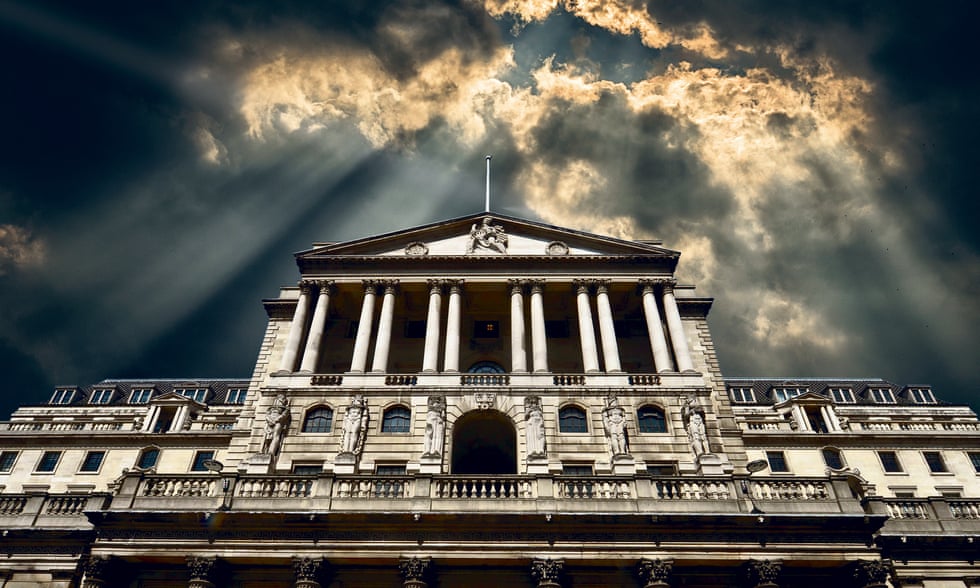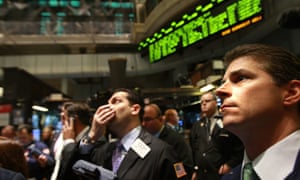By
-
Bank lending no longer ‘sufficiently active’ to sustain Libor
-
FCA’s Bailey says decision not linked to past manipulation
Andrew Bailey,
chief executive officer at Financial Conduct Authority, explains the
decision to end Libor in 2021 in favor of a more-reliable system. He
speaks with Bloomberg's Francine Lacqua on 'Bloomberg Surveillance.'
(Source: Bloomberg)
Libor, the nearly 50-year-old global borrowing benchmark
that became a byword for corruption, is headed for the trash heap of
history.
The U.K. Financial Conduct Authority will phase out the key interest-rate indicator by the end of 2021 after it became clear there wasn’t enough meaningful data to sustain the benchmark that underpins more than $350 trillion in securities, Andrew Bailey, the head of the regulator, said in a speech Thursday at Bloomberg’s London office.
The end of the London interbank offered rate, or Libor, is welcome on many levels for regulators. It was tied to some of the banking industry’s biggest scandals, leading to about $9 billion in fines and the conviction of several bankers for manipulating the rate. Relying on the opinions of industry insiders to set the daily estimates based on interbank lending -- some in markets that saw fewer than 20 transactions annually -- was unacceptable, Bailey said.
"Libor is trying to do too many things: it’s trying to be a measure of bank risk and it’s trying to substitute for interest-rate risk markets where really it would be better to use a risk-free rate," said Bailey in an interview with Bloomberg News before the speech. "It’s had to come to a conclusion."
Bailey said setting a firm schedule will help banks and finance companies manage the transition from Libor, which is behind securities including student loans and mortgages.
Read more: What Is Libor and Why It Will Soon Be History
The benchmark is the average rate a group of 20 banks estimate they’d be able to borrow funds from each other in five different currencies across seven time periods, submitted by a panel of lenders every morning. Its administration was overhauled in the wake of the scandal, with Intercontinental Exchange Inc. taking over from the then-named British Bankers’ Association with the aim of making the rate more transaction-based.
But the 58-year-old Bailey said the market supporting Libor -- where banks provide each other with unsecured lending -- was no longer "sufficiently active" to determine a reliable rate and alternatives must be found. For one currency and lending period there were only 15 transactions in 2016, he said.
Read more: QuickTake: Broken Benchmarks
The search for a new benchmark may lead to tighter swap markets, lower rates and richer attorneys as contracts need to be rewritten and adjusted to remove Libor.
“The impact of this decision from the FCA is to put uncertainty into all Libor-based swap rates,” said Peter Chatwell, head of European Rates Strategy at Mizuho International Plc in London. “The market will need guidance as to what a replacement could be and this will lead to increased volatility and possibly reduced liquidity in the near term.”
The FCA only started regulating Libor in 2013, the same year legislation was passed making it a criminal offense to take any misleading action in relation to financial benchmarks.
Read more: Why Replacing Libor Isn’t Easy
The FCA chief said the regulator has spent a lot of time persuading banks to continue submitting rates, something the agency has the power to enforce, but the lack of liquidity makes this impossible to maintain and leaves it open to manipulation.
However, he told Bloomberg Thursday the proposed change didn’t excuse the abuse of the benchmark that has seen five former bankers jailed in the U.K. and a number of others convicted in the U.S.
"The issues that we’re dealing with today do not in any sense excuse or mitigate what went on," Bailey said. "Those who say that this demonstrates that what went on in the past is somehow understandable because the system was broken, I’m afraid that is not an argument that this justifies at all."
The FCA has spoken to the panel banks over recent months about ending the use of Libor and how much time it would take to wind-down, Bailey said. While it would be tough, most said it could be done in four or five years, and the FCA has asked banks to continue submitting rates until the end of 2021.
“We’ve had no conversations about using capital tools,” Bailey said in response to questions after his speech. “But you can take it for granted that if we don’t see the progress that we need to see to hit this time scale, then in the broader sense there will be a ‘push’ from authorities.”
The development comes as a number of groups have been considering alternatives to Libor.
The U.K. Financial Conduct Authority will phase out the key interest-rate indicator by the end of 2021 after it became clear there wasn’t enough meaningful data to sustain the benchmark that underpins more than $350 trillion in securities, Andrew Bailey, the head of the regulator, said in a speech Thursday at Bloomberg’s London office.
The end of the London interbank offered rate, or Libor, is welcome on many levels for regulators. It was tied to some of the banking industry’s biggest scandals, leading to about $9 billion in fines and the conviction of several bankers for manipulating the rate. Relying on the opinions of industry insiders to set the daily estimates based on interbank lending -- some in markets that saw fewer than 20 transactions annually -- was unacceptable, Bailey said.
"Libor is trying to do too many things: it’s trying to be a measure of bank risk and it’s trying to substitute for interest-rate risk markets where really it would be better to use a risk-free rate," said Bailey in an interview with Bloomberg News before the speech. "It’s had to come to a conclusion."
Bailey said setting a firm schedule will help banks and finance companies manage the transition from Libor, which is behind securities including student loans and mortgages.
Read more: What Is Libor and Why It Will Soon Be History
The benchmark is the average rate a group of 20 banks estimate they’d be able to borrow funds from each other in five different currencies across seven time periods, submitted by a panel of lenders every morning. Its administration was overhauled in the wake of the scandal, with Intercontinental Exchange Inc. taking over from the then-named British Bankers’ Association with the aim of making the rate more transaction-based.
But the 58-year-old Bailey said the market supporting Libor -- where banks provide each other with unsecured lending -- was no longer "sufficiently active" to determine a reliable rate and alternatives must be found. For one currency and lending period there were only 15 transactions in 2016, he said.
Serious Question
"The absence of active underlying markets raises a serious question about the sustainability of the Libor benchmarks," said Bailey, who is widely seen as a candidate to be the next governor of the Bank of England. "If an active market does not exist, how can even the best run benchmark measure it?"The search for a new benchmark may lead to tighter swap markets, lower rates and richer attorneys as contracts need to be rewritten and adjusted to remove Libor.
“The impact of this decision from the FCA is to put uncertainty into all Libor-based swap rates,” said Peter Chatwell, head of European Rates Strategy at Mizuho International Plc in London. “The market will need guidance as to what a replacement could be and this will lead to increased volatility and possibly reduced liquidity in the near term.”
The FCA only started regulating Libor in 2013, the same year legislation was passed making it a criminal offense to take any misleading action in relation to financial benchmarks.
Read more: Why Replacing Libor Isn’t Easy
The FCA chief said the regulator has spent a lot of time persuading banks to continue submitting rates, something the agency has the power to enforce, but the lack of liquidity makes this impossible to maintain and leaves it open to manipulation.
However, he told Bloomberg Thursday the proposed change didn’t excuse the abuse of the benchmark that has seen five former bankers jailed in the U.K. and a number of others convicted in the U.S.
"The issues that we’re dealing with today do not in any sense excuse or mitigate what went on," Bailey said. "Those who say that this demonstrates that what went on in the past is somehow understandable because the system was broken, I’m afraid that is not an argument that this justifies at all."
The FCA has spoken to the panel banks over recent months about ending the use of Libor and how much time it would take to wind-down, Bailey said. While it would be tough, most said it could be done in four or five years, and the FCA has asked banks to continue submitting rates until the end of 2021.
Push from Authorities
Bailey said he could see a situation where there is more than one benchmark, with some including bank credit risk while others exclude that data. While discussions with banks and other users of Libor are at early stages, he said it may take a “push” from authorities to move the process forward at times.“We’ve had no conversations about using capital tools,” Bailey said in response to questions after his speech. “But you can take it for granted that if we don’t see the progress that we need to see to hit this time scale, then in the broader sense there will be a ‘push’ from authorities.”
The development comes as a number of groups have been considering alternatives to Libor.
Bank of England Governor Mark Carney said earlier this month that Libor is no longer suitable. The central bank said in April that a swaps-industry working group had proposed replacing Libor in contracts with the Sterling Overnight Index Average, or Sonia, a near risk-free alternative derivatives reference rate that reflects bank and building societies’ overnight funding rates in the sterling unsecured market.
The bank had no further comment when contacted on Thursday.
Concerns have mounted in the euro area over Euribor, the benchmark interest rate for $180 trillion a year of intra-bank lending, as banks pull out of rate-setting panels in the wake of the Libor-rigging scandal. The European Central Bank acknowledges the shortcomings of the mechanism but wants the financial industry to take the lead in finding a solution.
In June, a U.S. government body, the Alternative Reference Rates Committee, recommended replacing Libor with a new, broad Treasuries repo rate, linked to the cost of borrowing cash secured against U.S. government debt.
Switzerland is replacing its own key swaps rate, TOIS, with a new benchmark on Dec. 29.
Asked whether this transition away from Libor should have happened earlier, Bailey said it would have been hard to predict five years ago that the world would still be in an environment of quantitative easing and low interest rates.
"I’m not criticizing the reforms, they were done with good intent and with a view that the market would return," Bailey told Bloomberg. "We are where we are."
— With assistance by Jill Ward, Paul Gordon, and Luca Morreale



 ‘
‘
